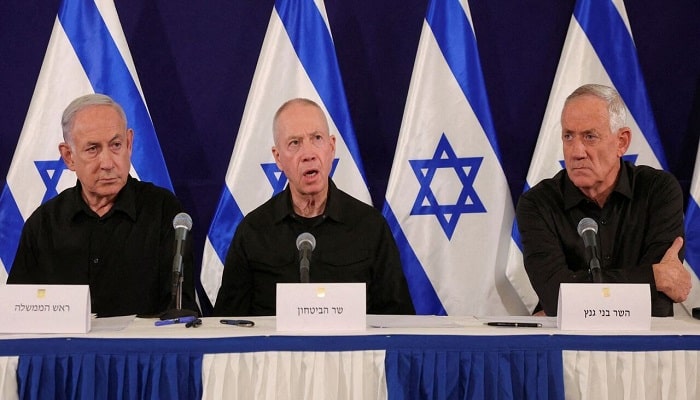PNN – Endless grudges and arguments over war tactics have led to mistrust between Prime Minister Benjamin Netanyahu, Defense Minister Yoav Galant, and former IDF chief Benny Gantz.
According to the report of Pakistan News Network from the Wall Street Journal, with the Gaza war entering its seventh month, the public opinion in the occupied territories has suffered countless differences regarding the outcome of this war, and the three main military figures of this regime are in a desperate attempt to remove anxiety from the public mind.
During the last seven months, these three people have had strong disagreements over key issues for decision-making, such as how to start a decisive military pressure, the release of prisoners and the administration of the Gaza Strip after the war, and now the biggest challenge in the history of this regime is how to react to Iran’s punitive response.
The play with fire of these three will determine whether the Gaza conflict will turn into a full-scale regional battle with Iran or the new geopolitical order of the Middle East will be keyed and the regime’s relations with the United States will be forever changed.
Former army general and national security adviser of the Zionist regime, Giora Eiland says: The lack of trust between these three people is quite clear and significant.
Benjamin Netanyahu is trying to take full control of the battlefield while Gallant and Gantz try to reduce his participation in the decisions.

Gantz, who led the last major battle with Hamas a decade ago, has expressed his desire for Netanyahu to step down and called for early elections in September following mass protests by residents of the occupied territories.
Since Iran’s punitive response, these three members of the war cabinet of the occupying regime have met each other every day, but until now they have not announced the time, scale and place for their response. Because it is a big challenge for them to design a response that guarantees several important goals, i.e. deterring Iran, avoiding a regional war and not losing the support of the Arab countries and the United States.
This is why the risk of miscalculation is very high, says Raz Zimet, senior researcher at the Institute for National Security Studies based in Tel Aviv.
Gallant is the most belligerent figure among them, who proposed a preemptive attack on Lebanon’s Hezbollah at the time of the Gaza war.
Netanyahu is said to keep his two rivals in the dark on many key decisions. For example, he is trying to appoint a humanitarian aid official to report directly to him, bypassing the defense minister, with the aim of having sole control over logistical aid.
On the other hand, Amir Avivi, the founder of the “Defense and Security Association Think Tank” of this regime, says: If the defense minister is not aligned with him, it will be very difficult for Netanyahu to lead the army.
Gantz ran against Netanyahu in what observers describe as the “worst election” in the regime’s history. Last year, Netanyahu tried to oust Gallant, telling those around him that his old policies toward Gaza were doomed to failure.
Gantz and Gallant have had a strained relationship with each other for more than a decade even before joining the War Cabinet.
Those around Gantz have tried to force Netanyahu’s coalition and his party to leave the government and remove Netanyahu from power, thinking that the result of this action will be nothing but Gantz’s succession.
Netanyahu, who is known in domestic circles as the “wizard”, is now weakened for political reasons caused by the war, and space has been created for Golan Gantz and even Gallant to try their luck and finally end his decade and a half rule.
The extreme right wing of Netanyahu’s coalition has threatened to disband his government if any agreement is reached in the cease-fire talks in Cairo to end the war without destroying Hamas. At the same time, the center-right wing also demands a decisive response to Iran.

With the increasing conditions of the US President Joe Biden’s government to support this regime and considering the opposition of Gallant, who is more concerned about losing Washington, the decision to attack Rafah, the base of Hamas with more than one million Palestinians, for Netanyahu has become a nightmare.
The role and position of the Palestinian Authority, the idea of forming local groups to manage and interact with the Israeli army, or absolute anarchy that will ultimately give the Israeli forces complete control of the situation are just a few of the issues that Netanyahu and Gallant disagree on.
Gantz wants an agreement to release the prisoners, while Netanyahu and Gallant consider military pressure along with negotiations to be the solution.
Many consider Netanyahu’s extreme stubbornness to be the reason for the failure of any negotiations, and in the meantime, the martyrdom of Ismail Haniyeh’s three children last week thwarted the American mediation efforts.
With increasing pressure to hold early elections, the hollowness of Netanyahu’s promise to defeat Hamas is becoming increasingly apparent. After the massacre of 33,000 Palestinians and the killing of many international attacks, he has not yet been able to arrest Yahya Sinwar (Abu Ibrahim), one of the leaders of Hamas, who, according to Israel, led the Al-Aqsa storm operation.
Street demonstrations for Netanyahu’s ouster are still ongoing, and if Gantz resigns from the cabinet, at least five other members of the Likud party will also resign, thus, his party will fall from the majority position.
This is why Ofer Shalah, a lawyer and political analyst of the “Institute for National Security Studies” of the occupation regime, believes that “the most important issue for Netanyahu right now is to survive in politics; “The longer the current situation lasts, the more likely he will remain in his position.”

